Lebanon calls for US mediation amidst Israel-Hezbollah strikes
At the same time Lebanese FM criticises US President Biden's call for calm as inadequate.
1727242511-0/BeFunk_§_-(50)1727242511-0-640x480.webp)
As cross-border attacks intensify due to the Israel-Hezbollah conflct, Lebanon has appealed to the United States for diplomatic intervention, warning that Washington is the only global power capable of halting the escalating violence.
As Lebanon endures increasing airstrikes and civilian casualties, its government has turned to the US for diplomatic support.
Lebanese Foreign Minister Abdallah Bou Habib criticised US President Joe Biden’s call for calm as inadequate, emphasising that only Washington, Israel’s closest ally, could help broker a ceasefire.
“The United States is the key to our salvation,” Bou Habib said at an event hosted by the Carnegie Endowment for International Peace in New York, adding that Lebanon’s prime minister plans to meet with US officials in the coming days.
Lebanon faces a severe humanitarian crisis as the violence displaces hundreds of thousands of people.
Previously, Israel ordered residents of Lebanon’s Bekaa Valley, located in the east, to evacuate before launching a massive bombing campaign in the area.
Health Minister Abiad estimated that half a million people have fled their homes in southern Lebanon, with many seeking shelter in makeshift camps, schools, and public buildings in Beirut and Sidon.
Volunteers have scrambled to provide basic supplies like water, food, diapers, and medicine to the displaced, but the strain on resources is immense.
In one Beirut shelter, 11-month-old Matila slept on a mattress while children scribbled on a whiteboard to pass the time. “The kids are living through terrible conditions. They’re exhausted and stressed,” said Rima Ali Chahine, a volunteer helping care for the displaced families.
Many Lebanese civilians described harrowing experiences as they fled Israeli strikes. Fatima Chehab, who fled from Nabatieh with her three daughters, recounted how her family had to relocate twice due to bombings.
Issa Baydoun, who evacuated his home in Shihine, accused Israel of targeting civilians despite Israeli claims that its strikes were focused on Hezbollah’s military infrastructure.
The conflict between Israel and Hezbollah has escalated after an IDF airstrike killed senior Hezbollah commander Ibrahim Qubaisi in Beirut on Tuesday, raising concerns of a wider Middle Eastern war.
Hezbollah confirmed Qubaisi’s death, stating that he headed the group’s missile and rocket force.
His death marks a significant development in Israel’s ongoing air campaign, which began on Monday.
Since then, the Israeli offensive has killed at least 569 people, including 50 children, and injured 1,835 others, according to Lebanon's Health Minister Firass Abiad.
The United Nations Security Council is scheduled to meet on Wednesday to address the situation, as international fears of a full-scale war grow.
The Israeli military claimed that its strikes on Hezbollah targets in southern Lebanon were part of a broader effort to neutralize the group’s military capabilities.
Israeli Defense Minister Yoav Gallant stated that Hezbollah had suffered severe blows to its command structure, fighters, and military assets, but vowed that the campaign would continue.
Israel also struck targets in Syria, including the coastal city of Tartous, where missiles were intercepted by Syrian air defenses, further raising tensions in the region.
In response to the Israeli bombardment, Hezbollah launched rockets at Israeli military bases, including the Dado base in northern Israel and the Atlit naval base south of Haifa.
While several Israeli soldiers and civilians were injured in these attacks, most injuries were reported as non-critical.
The escalating conflict between Israel and Hezbollah has compounded fears that nearly a year of fighting between Israel and the Palestinian group Hamas in Gaza is set to engulf the entire region.
The war on Gaza, which began in October, has already drawn international concern for its potential to destabilise the broader Middle East.
As the violence rages on in Lebanon, international efforts to mediate a ceasefire have stalled.
US allies Qatar and Egypt have been unable to secure a truce in Gaza or Lebanon.
Hezbollah, which has close ties to Hamas, has indicated that it would stop its rocket attacks on Israel if a ceasefire in Gaza is achieved, but no progress has been made.
Iran, Hezbollah’s key backer and a longtime adversary of Israel, has also called for international intervention.
Iranian President Masoud Pezeshkian, addressing the UN General Assembly, urged world leaders to pressure Israel into halting its military campaigns in both Gaza and Lebanon, warning that the conflict could engulf the region and potentially the world if left unchecked.
The UN Secretary-General António Guterres expressed grave concerns over the situation, stating that "Lebanon is at the brink" and calling for immediate efforts to prevent Lebanon from becoming another Gaza.
Guterres stressed that the people of Lebanon, Israel, and the world cannot afford for the conflict to spiral further out of control.
While calls for peace have intensified, diplomatic solutions remain elusive.
The UN Security Council's upcoming meeting is seen as a pivotal moment, but with both sides entrenched in their positions and Hezbollah vowing to continue its attacks, the prospects for a ceasefire remain uncertain.
As airstrikes continue to pound southern Lebanon and civilians flee in growing numbers, the international community watches anxiously, aware that the conflict’s outcome could have far-reaching consequences across the Middle East and beyond.
Flouting a UN Security Council resolution calling for an immediate cease-fire, Israel has also continued a brutal offensive on Gaza since a Hamas attack last October 7.
Over the course of nearly a year, Israeli attacks have killed more than 41,000 people, mostly women and children, and injured over 95,500, according to local health authorities.
The Israeli onslaught has displaced almost the entire population of the territory amid an ongoing blockade that has led to severe shortages of food, clean water, and medicine.
Israel also faces accusations of genocide for its actions in Gaza at the International Court of Justice.


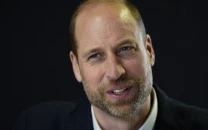
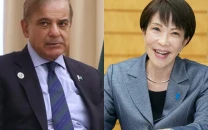
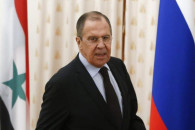
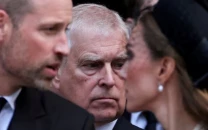
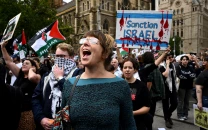











COMMENTS
Comments are moderated and generally will be posted if they are on-topic and not abusive.
For more information, please see our Comments FAQ